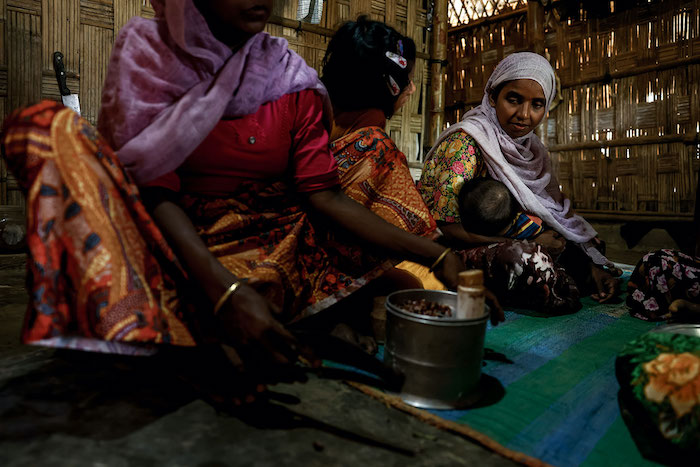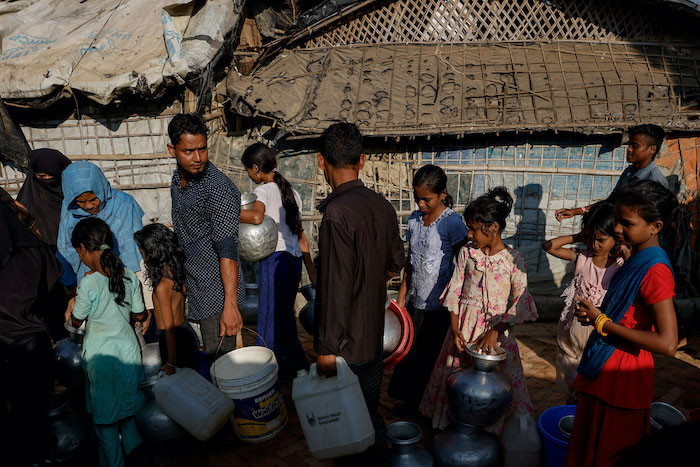The Myanmar military is seeking to hide a food crisis affecting an estimated 14 million people across the country, which is particularly severe in western Rakhine State.
An investigation by Reuters has found that the ruling junta has suppressed information about the crisis by pressuring researchers not to collect data about hunger and ordering aid workers not to publish it.
In conversations over the past two years, junta representatives have warned senior aid workers against releasing data and analysis that indicates more than a quarter of people in Myanmar are experiencing serious hunger, according to people familiar with the matter.
ALSO SEE: Russian Tankers Sink in Black Sea, US Warns on ‘Dark Fleet’
In a sign of the sensitivity around this data, the world’s leading hunger watchdog – the Integrated Food Security Phase Classification (IPC) – in recent weeks removed its color-coded assessment of Myanmar from the global map on its website where it displays the levels of hunger afflicting dozens of countries.
The reason: fears for the safety of the researchers who provide the data.
And in another move to protect data collectors and analysts from the junta, the IPC never made public three detailed analyses that showed the war-torn Southeast Asian nation, once known as the rice bowl of Asia, was facing one of the worst food crises on the planet.
Reuters spoke to more than 30 aid workers, researchers, diplomatic sources and United Nations officials about hunger in Myanmar. Most declined to speak on the record, saying they feared retribution by the military.
Myanmar has been in turmoil since the military ousted an elected government in 2021, sparking mass protests that escalated into an armed rebellion on many fronts.
An official at Myanmar’s Ministry of Information didn’t respond to questions for this story.
70,000 flee crisis in Rakhine state
Reuters also uncovered at least four examples of how the junta blocked aid distribution or seized food supplies intended for the hungry. One such spot is the western state of Rakhine, where there has been a surge in violence in the past year following the collapse of a ceasefire between a powerful rebel group called the Arakan Army and the military.
In Rakhine, home to the persecuted Rohingya Muslim minority, the military in recent months has prevented the delivery of food and medicine to severely malnourished children in an area gripped by cholera, according to aid workers.
Hunger in Rakhine is so severe it is partly responsible for an exodus of 70,000 refugees this year to Bangladesh, almost 50% more than previously reported. In November, the United Nations Development Program warned that Rakhine is on the brink of an “acute famine,” putting more than two million people at risk of starvation.

Tom Andrews, the UN’s special envoy for human rights in Myanmar, said the junta is “systematically restricting” humanitarian aid access, contributing to the spread of cholera and other infectious diseases. He said he has received reports that many of the hundreds of thousands of needy people cut off from international assistance “are on the brink of starvation.”
The junta’s rule has had a “catastrophic impact on agriculture and food supply,” a spokesperson for the British embassy in Yangon said. “People are going hungry daily, children are malnourished, and millions are being plunged into poverty.”

Three other states hiding food crises
The situation in Myanmar highlights how the global system for tackling hunger and preventing famine – comprising UN agencies, non-governmental humanitarian groups and donor countries – is under enormous strain. Last year, almost 282 million people in 59 countries and territories faced high levels of acute food insecurity.
Reuters is documenting the global hunger-relief crisis in a series of reports, including from Sudan and Afghanistan.
One of the chief obstacles to alleviating hunger is national governments that thwart aid efforts, including the collection of nutrition data, whether to avoid the embarrassment of needing outside help or to prevent food from reaching enemy-held territory.
Besides Myanmar, an overview found that in three other countries now suffering food crises – Ethiopia, Yemen and Sudan – governments or rebels have blocked or falsified the flow of data to the IPC, or have tried to suppress IPC findings.
In private discussions with UN officials, junta representatives have criticized data published on Myanmar’s hunger crisis and have said they don’t want the country to be considered a failed state or compared to conflict-torn places like Ukraine and Gaza.
At one session in the capital, Myanmar’s foreign minister addressed food security with UN officials over plates of snacks. There is no food security crisis, the minister said, according to people familiar with the meeting.
The junta’s foreign ministry and information ministry didn’t respond to emailed requests for comment. The junta has said it doesn’t block humanitarian aid from international organizations and that it ensures available assistance reaches those in need.
Hunger forced caused me to flee, mother tells
It was hunger, not just the fighting, that pushed heavily-pregnant Juhara Begum to risk a perilous journey out of Myanmar’s Rakhine state. The 25-year-old said her family had to survive on leaves and other vegetation. There was nothing to eat, so when her older son, a toddler, cried they gave him a piece of banana stem to suck on to relieve the hunger.
“It felt like hell,” she said, speaking at a refugee camp in southern Bangladesh near the coastal town of Cox’s Bazar. She arrived there last month after a days-long walk.
Other recent arrivals include 23-year-old Kasmida Begum, her husband Sulaiman and their two young children. She said there was so little to eat that she was unable to breastfeed their baby. “Where will milk be produced from, if I am hungry all the time?” she asked.
In private discussions with UN officials, junta representatives have criticized data published on Myanmar’s hunger crisis and have said they don’t want the country to be considered a failed state or compared to conflict-torn places like Ukraine and Gaza.
Despite the intimidation, some headline data on Myanmar’s food crisis has been published. In recent days, both the World Bank and the UN have released reports showing that hunger there is significantly worsening for millions of people.
Like other aid groups, the UN’s World Food Program (WFP) delivers reports to local authorities, donors and partner organizations on its operations in the countries where it works.
To protect its staff and local partners, the WFP, the UN’s main food-aid distributor, hasn’t published its situational reports for Myanmar since June 2023. The reports provide the latest updates on the WFP’s activities and responses to emergencies. The WFP also hasn’t released its Annual Country Report for Myanmar since 2022.
- Reuters with additional editing by Jim Pollard
ALSO SEE
ASEAN Seeks End to Myanmar War, Swift Deal on S China Se
Thai Task Force to Help Stop Arms Funding For Myanmar Military
Suu Kyi Adviser Calls For Sanctions on Myanmar’s Central Bank
UN Rapporteur Calls on Thai Banks to Stop Aiding Myanmar Junta
Scamming Compounds in SE Asia Stole $64 Billion in 2023: Report
US, UK and Canada Ramp up Action Against Myanmar Junta
Myanmar’s Central Bank Cancels 120 Forex Licences – RFA
Key Bangladeshi Bank Freezes Myanmar Regime Accounts
UOB to Cut Ties With Myanmar Banks on Sept 1 – Nikkei
EU, US Sanctions Aim to Curb Funds for War in Myanmar
Crime Gangs Control Some Myanmar, Laos Economic Zones: UN
Myanmar Heading For State Collapse, ICG Warns
























